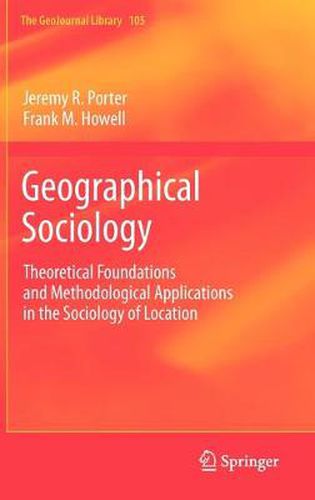Readings Newsletter
Become a Readings Member to make your shopping experience even easier.
Sign in or sign up for free!
You’re not far away from qualifying for FREE standard shipping within Australia
You’ve qualified for FREE standard shipping within Australia
The cart is loading…






This title is printed to order. This book may have been self-published. If so, we cannot guarantee the quality of the content. In the main most books will have gone through the editing process however some may not. We therefore suggest that you be aware of this before ordering this book. If in doubt check either the author or publisher’s details as we are unable to accept any returns unless they are faulty. Please contact us if you have any questions.
The discipline of Sociology has a rich history of including spatial context in the analysis of social issues. Much of this history has revolved around the development and application of spatial theory aimed at understanding the geographic distribution of social problems, the organization of communities, and the relationship between society and the environment. More recently, the social sciences have seen a large number of technological innovations that now make it possible to place social behaviour in spatial context. Consequently, because of the historical disjuncture in the development of spatial theory and the recent development of relevant methodological tools, the relationship between materials describing both the methodological approaches and their theoretical importance a scattered throughout various books and articles. Geographical Sociology consolidates these materials into a single accessible source in which spatial concepts such as containment, proximity, adjacency, and others are examined in relation to such methodological tools as hierarchical linear models, point pattern analysis, and spatial regression. As these methods continue to increase in popularity among social scientists the ability to more generally understand societies relationship to geographic space will continue to increase in it importance in the field. This book represents a starting point to linking these concepts to practice and is presented in an accessible form in which students, researchers, and educators can all learn, and in turn, contribute to its development.
$9.00 standard shipping within Australia
FREE standard shipping within Australia for orders over $100.00
Express & International shipping calculated at checkout
This title is printed to order. This book may have been self-published. If so, we cannot guarantee the quality of the content. In the main most books will have gone through the editing process however some may not. We therefore suggest that you be aware of this before ordering this book. If in doubt check either the author or publisher’s details as we are unable to accept any returns unless they are faulty. Please contact us if you have any questions.
The discipline of Sociology has a rich history of including spatial context in the analysis of social issues. Much of this history has revolved around the development and application of spatial theory aimed at understanding the geographic distribution of social problems, the organization of communities, and the relationship between society and the environment. More recently, the social sciences have seen a large number of technological innovations that now make it possible to place social behaviour in spatial context. Consequently, because of the historical disjuncture in the development of spatial theory and the recent development of relevant methodological tools, the relationship between materials describing both the methodological approaches and their theoretical importance a scattered throughout various books and articles. Geographical Sociology consolidates these materials into a single accessible source in which spatial concepts such as containment, proximity, adjacency, and others are examined in relation to such methodological tools as hierarchical linear models, point pattern analysis, and spatial regression. As these methods continue to increase in popularity among social scientists the ability to more generally understand societies relationship to geographic space will continue to increase in it importance in the field. This book represents a starting point to linking these concepts to practice and is presented in an accessible form in which students, researchers, and educators can all learn, and in turn, contribute to its development.